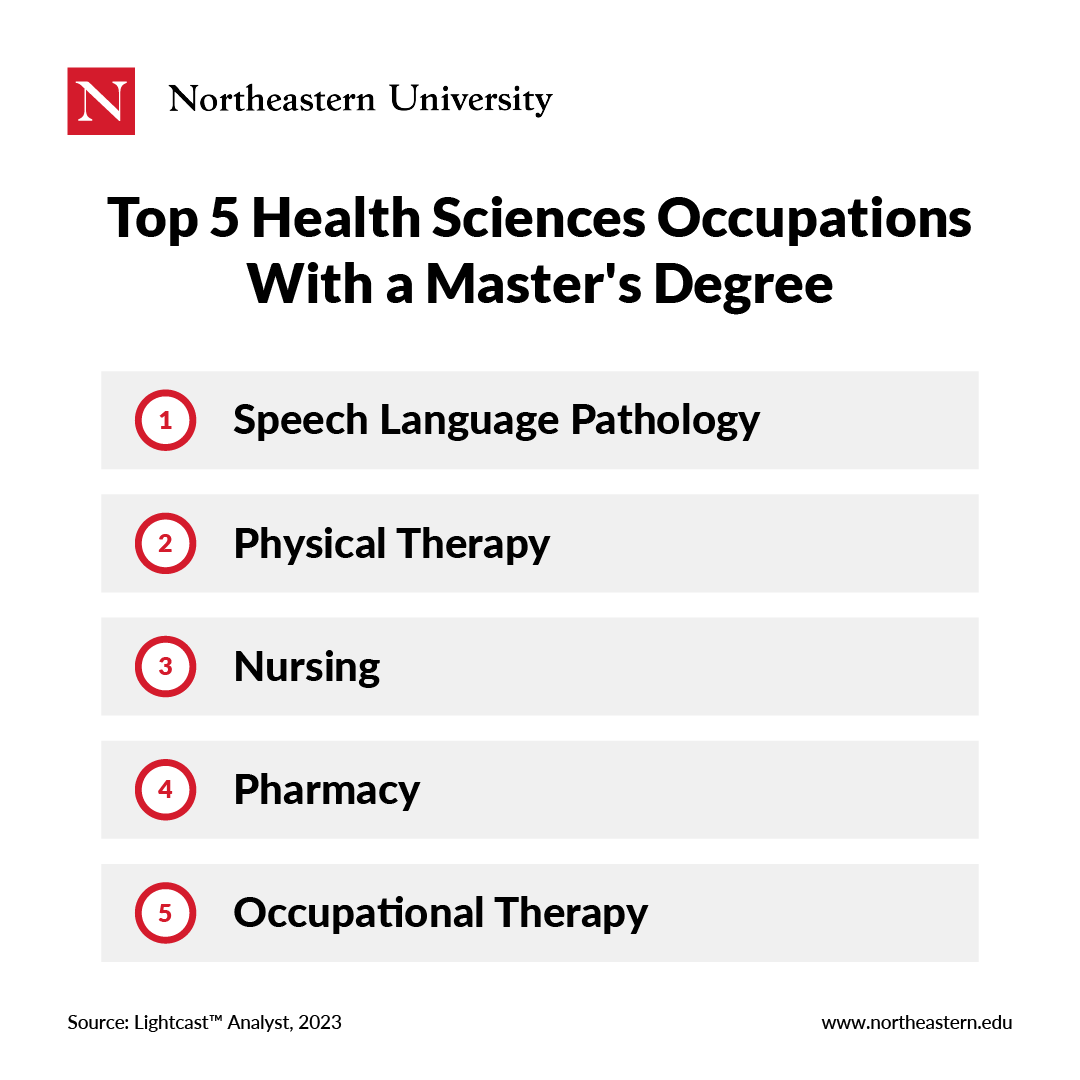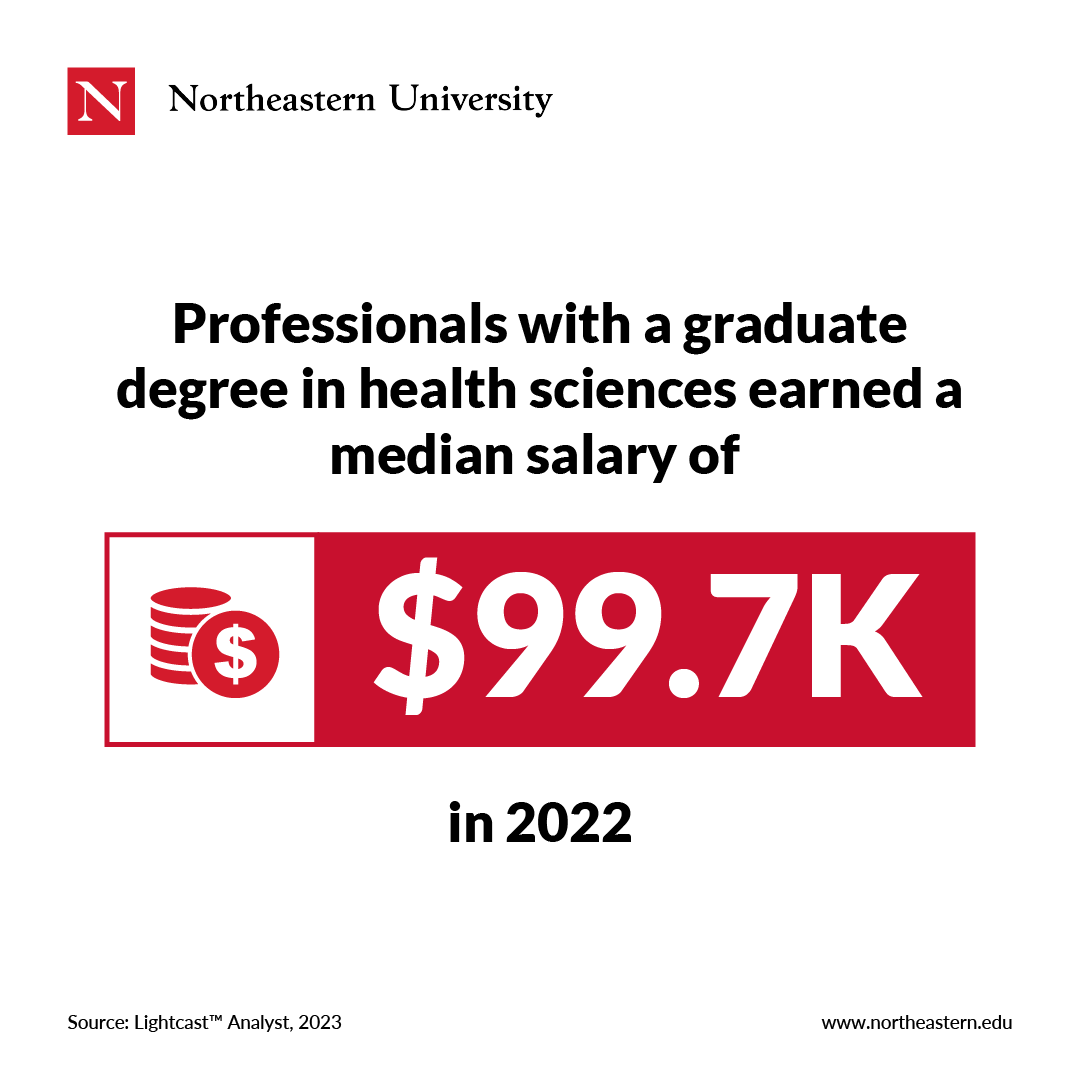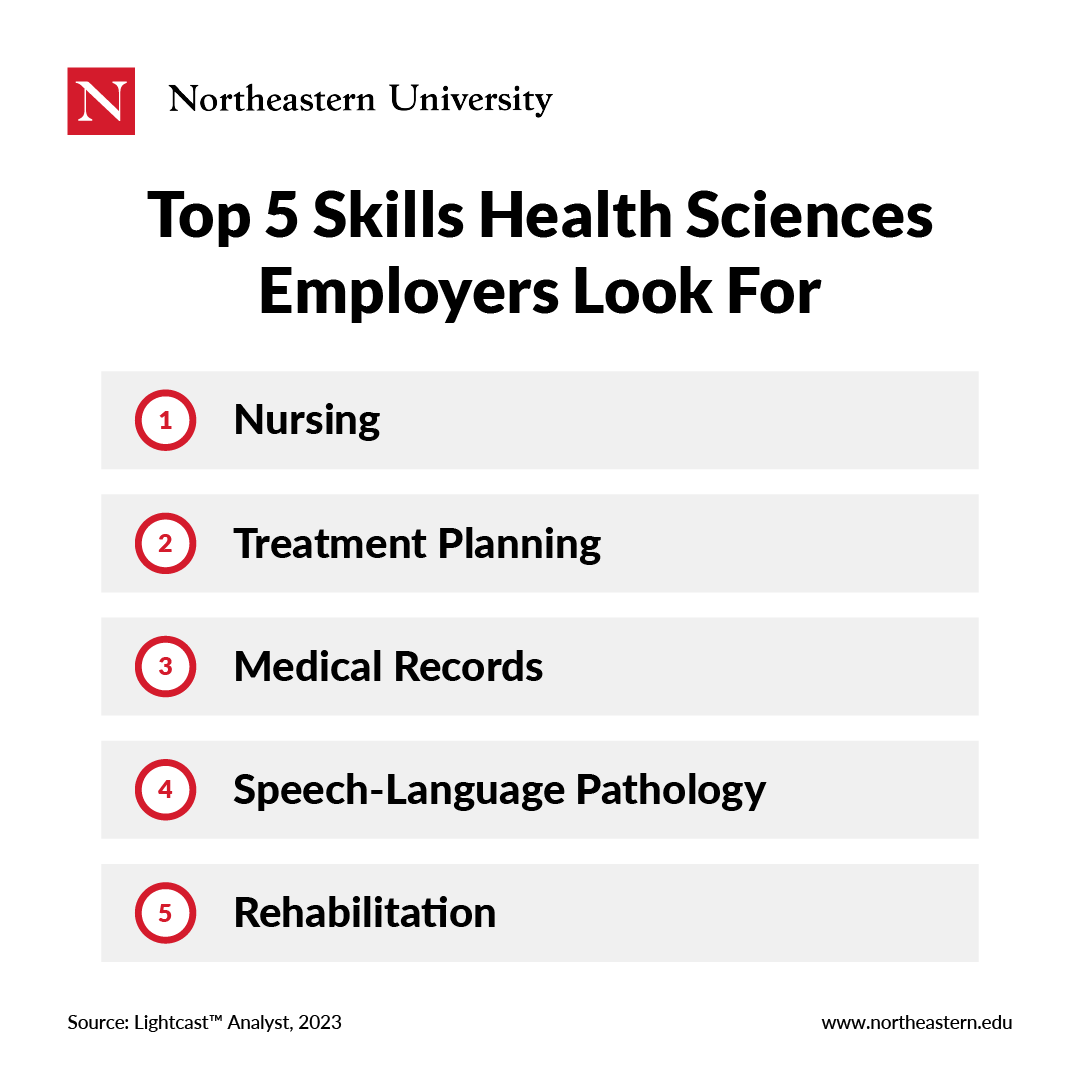As a result of technological advancements and a newfound emphasis on holistic health, career opportunities in the health sciences industry have expanded exponentially. However, with these changes, an increasing number of professionals are becoming aware of gaps in their skills, experience, and qualifications.
One of the best ways to address these challenges and upskill in the healthcare industry is to earn a master’s degree. If you’re interested in pursuing this option and earning a degree in the health sciences field, here’s an overview of why advancing your education can be extremely beneficial to your career.
What You Can Do With a Master’s Degree in the Health Sciences Field
Like many industries, healthcare is constantly changing. While obtaining a graduate degree in the health sciences is a known prerequisite for patient-facing careers, recent trends have shown numerous career paths that focus on helping others both in and outside a hospital.
“It just makes sense to study healthcare if you’re looking for a career that focuses on care and compassion,” says Justin Roy, Assistant Dean of Enrollment Management at Northeastern’s Bouvé College of Health Sciences. And, while nurses and doctors can help diagnose various illnesses, Roy adds that “care and compassion can also be found in fields like speech and language pathology, where people are trying to figure out ways to work with Parkinson’s patients.”
If you’re still wondering if a health sciences degree is worth the investment, here are the most common career paths for professionals with this credential according to our analysis of job posting data.

1. Speech Language Pathology
Speech-language pathologists (SLPs) are professionals trained in all aspects of speech and communication. SLPs provide a wide range of care for patients with speech disorders, but the most well-known services revolve around:
- Speech sounds
- Language
- Literacy
- Fluency
While becoming an SLP requires earning an undergraduate degree, those interested in this highly rewarding field also need a master’s degree accredited by the Council on Academic Accreditation in Audiology and Speech-Language Pathology (CAA). Some common program titles include Master of Science in Speech-Language Pathology or Master of Science in Communication Science and Disorders.
In addition to meeting licensure requirements, earning a master’s degree has a direct impact on how much you can make as an SLP. According to our analysis of job posting data, the median annual salary for graduate-level SLPs throughout the U.S. is $91,500.
If this career path interests you, it’s important to consider whether speech pathology is the right fit for you before pursuing this specialized education.
2. Physical Therapy
According to the American Physical Therapy Association (APTA), a physical therapist (PT) is a healthcare professional who helps people live healthy and active lives.
“These professionals assist with the pathology of human movement and help patients navigate challenges associated with their orthopedic, neurological, and cardiovascular systems,” says Dr. Christopher Cesario, Interim Chairperson and Clinical Professor for the Doctor of Physical Therapy (DPT) program at Northeastern University’s Bouvé College of Health Sciences.
While obtaining a kinesiology degree is an important step to becoming a physical therapist, earning an advanced, specialized education is the only way to practice in the U.S. legally. In this case, aspiring PTs need a DPT degree to effectively demonstrate their expertise in human movement.
In addition to the career stability it provides, earning an advanced degree in physical therapy also offers a rewarding salary. According to our analysis of job postings data, physical therapists with an advanced education earn a median annual salary of $92,500. However, physical therapist salaries continue to rise throughout the U.S., making this degree an excellent return on investment.
3. Nursing
While nursing is a well-known career outcome in healthcare, the need for well-educated, highly skilled professionals in the field has never been greater. Due to severe nursing shortages in the aftermath of the pandemic, what was once a highly competitive job market is now an industry of immense opportunity.
This is particularly important since nurses are the cornerstone of patient care, offering not only medical expertise but also compassion and emotional support. Nurses are responsible for assessing and identifying patients’ needs and implementing and monitoring each patient’s medical plan and treatment.
A graduate education in nursing equips you with the advanced clinical skills, leadership capabilities, and specialized knowledge needed to navigate the challenges of modern healthcare. As a result, this education not only empowers you to take on a clinical role but also provides the building blocks to other degree programs that can help you take on a leadership or management role in healthcare administration.
Along with these valuable clinical and non-clinical skills, earning a master’s degree in nursing can boost your earning potential. According to our analysis of job posting data, the average nurse with a master’s degree in the U.S. earns a median salary of $127,400 per year.
If you’re interested in assuming a pivotal role in patient care, research, education, policy-making, or administration in healthcare, earning a master’s degree in nursing is an excellent first step in achieving these goals.
4. Pharmacy
Being a pharmacist is one of the more common career outcomes for earning a pharmacy-related degree. These healthcare professionals are specifically trained to store, handle, prepare, and dispense various medications, as well as educate patients on how to administer them.
Becoming a pharmacist doesn’t mean you need to work in a retail drugstore setting, however. Numerous types of pharmacy careers benefit from an advanced pharmacy degree, including:
- Long-Term Care Pharmacist
- Consultant Pharmacist
- Clinical Pharmacist
- Industry Pharmacist
- Research Pharmacist
Additionally, advancing your education in pharmacy can provide additional career opportunities outside of the pharmaceutical industry. For example, pharmacists can work in ambulatory care—providing care to patients in primary care offices with chronic conditions—or regulatory jobs that focus on ensuring the standards for patient care are followed in the pharmaceutical industry.
While the job opportunities can vary, according to our analysis of job posting data, the average professional with a master’s-level education in pharmacy earns a median salary of $124,700 per year. If pharmacy seems like a good career for you, consider earning a PharmD degree to ensure you qualify for licensure.
5. Occupational Therapy
Much like physical therapy, occupational therapy is a sector of healthcare that is rising in popularity. By taking a holistic approach to improving patients’ quality of life, occupational therapists help people overcome physical, cognitive, emotional, and developmental challenges.
While similar, occupational therapy takes a slightly different approach to care compared to physical therapy—focusing on helping individuals develop skills to resume daily activities rather than physical movement and mobility.
As a result, earning a master’s degree in this field has become an essential step for aspiring practitioners. It can deepen the foundational knowledge from an undergraduate degree while also offering specialized training in advanced techniques, research methodologies, and clinical reasoning.
In addition, earning a master’s degree can boost your overall earning potential in the field. According to our analysis of job posting data, occupational therapists throughout the U.S. earn a median annual salary of $88,800. As a result, the time and money invested in advancing your education will ultimately pay off once you enter the workforce.
4 Reasons a Master’s from a Health Sciences Program Is Worth It
Earning a master’s degree from a health sciences program can offer numerous benefits. However, here are the top four reasons why advancing your education in health sciences is worth it.
1. Raises Earning Potential
While earning a master’s degree is a requirement for several healthcare careers, advancing your education is directly linked to your overall earning potential because it gives you the credentials needed to obtain high-paying jobs.
According to our analysis of job posting data, the average median salary of a professional with a master’s degree related to healthcare and health sciences in 2022 was $99,700 per year. Considering the many career paths and industries under this umbrella, this is a promising return on investment for aspiring healthcare professionals.

In addition, the healthcare industry’s market value is projected to continue growing. According to Zippia, U.S. healthcare revenue in 2021 reached $4.3 trillion. “So, really, your degree becomes an appreciating asset,” Roy adds. These are important considerations to factor in when deciding if and when to enroll in a health sciences program—especially if costs are a challenge.
2. Increases Career Opportunities
For many, the value of an education is measured by how fast it can help you gain employment. Luckily, our analysis of job posting data shows that job opportunities in the field are expected to grow in many healthcare sectors. For example, job postings for SLPs are projected to grow 13 percent by 2028 and upwards of 24 percent by 2033.
The plethora of career opportunities isn’t just the result of growing demand in various healthcare sectors like physical therapy or speech-language pathology, though. Healthcare jobs are becoming popular among today’s career and industry changers as well. “More folks are looking at these programs asking ‘what is my entry into healthcare?’ In many cases, that’s not a bachelor’s degree anymore,” Roy concludes.
For example, if you’re a nurse or doctor who wants to practice outside of hospital walls, you don’t need to stay in traditional healthcare settings throughout your career. In fact, there are a number of careers in extreme medicine that provide additional job opportunities if you’re willing to obtain specialized education that develops the right skills.
3. Enhances Skills Development
When considering a healthcare career, there are a number of skills and qualifications that are important to develop. According to our analysis of job posting data, the most in-demand skills in health sciences careers are:
- Nursing
- Treatment Planning
- Medical Records
- Speech-Language Pathology
- Rehabilitation

It’s important to remember that not all of these skills are applicable to each area of health sciences, but there is plenty of overlap in the competencies across career outcomes. For example, careers in psychology often require skills in treatment planning, while professionals in human movement and rehabilitation also need this competency to be effective in their roles.
The faculty, curriculum, and experiential learning opportunities within a master’s degree program are all meant to facilitate this skills development, ensuring you’re the best healthcare professional you can be.
4. Boosts Marketability
Since a master’s degree is a prerequisite for several careers that require licensure, it can be hard to determine whether advancing your education will actually boost your marketability in the industry. According to our analysis of job posting data, 49 percent of speech-language pathologist job postings require a master’s degree.
However, there are other career paths that don’t require licensure but instead prefer specialized knowledge that master’s degree programs can offer. For example, according to our analysis of job posting data, 49 percent of speech-language pathologist job postings require a master’s degree.
In general, many health science employers prefer advanced education when evaluating job candidates, even if it’s not a mandated requirement. Perhaps the most illustrative example of this is the rising prominence of health informatics and real-world evidence roles being filled by graduate degree holders.
Overall, a master’s degree increases marketability due to the leadership skills and competencies it provides students. Northeastern is a great example of this. “Our programs focus on opening doorways and opportunities to leadership roles,” says Mike Crawford, Director of Marketing and Communications at Northeastern’s Bouvé College of Health Sciences.
Advance Your Education in Health Sciences
Despite the constant changes in healthcare, the value of a master’s degree isn’t going away. Benefits like skills development and specialized curriculum offer students the opportunity to serve their communities and connect with industry experts.
This is where institutions like Northeastern’s Bouvé College of Health Sciences shine. With a proven track record of excellence, Bouvé offers a transformative experience for healthcare professionals to excel in over 20 healthcare-related fields.






Related Articles
4 Pressing Global Health Problems We Face Today
Global Health Careers: How Can I Make a Difference?
Compliance Specialists: Who They Are and What They Earn